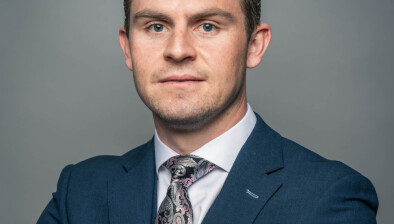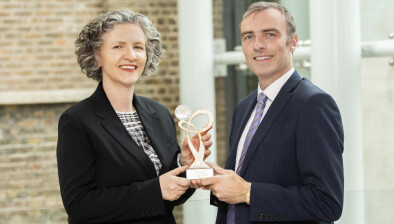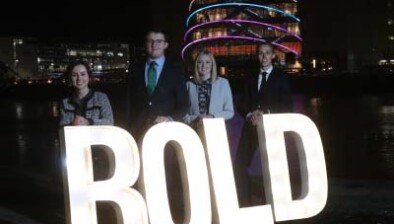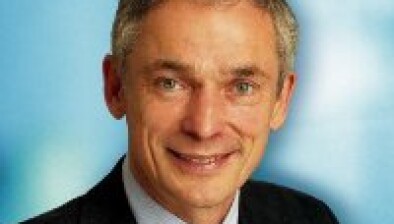Michael Farrell recognised by UCD with honorary doctorate of laws
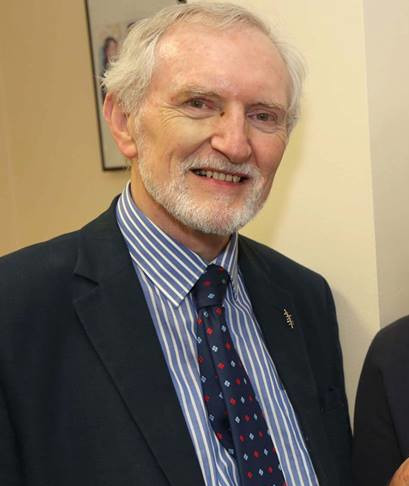
Michael Farrell
Human rights lawyer Michael Farrell, who played a key role in the introduction of Ireland’s gender recognition laws, has been awarded an honorary doctorate by University College Dublin (UCD).
As senior solicitor with legal rights group FLAC from 2005 to 2015, Mr Farrell worked on the landmark case in which the High Court ruled that Ireland’s lack of a gender recognition process for transgender people violated Dr Lydia Foy’s right to a private life.
Dr Foy and others who worked on the case were present as the award was made on Tuesday during the annual conferring of degrees to law graduates at the university.
Delivering the citation, Dr Liam Thornton of UCD Sutherland School of Law said: “Michael’s leadership, Michael’s keen legal mind, Michael’s clear, law-based argumentation, most importantly infused with a focus on the dignity of the person, resulted — albeit after very significant delay — in Ireland passing the Gender Recognition Act of 2015.”
He said Mr Farrell had “dedicated his professional life to highlighting injustices within our society”, noting his role as a civil rights leader and activist in Derry in the late 1960s and early 1970s, and his subsequent journalistic work highlighting the campaign for justice for the Birmingham Six and Guildford Four.
Mr Farrell’s “sense of fairness, his quest for justice, his knowledge of how law shapes society” led to his completion of a diploma in legal studies at what is now TU Dublin and his qualification as a solicitor in 1993, he said.
“It would not be possible to communicate all of Michael’s achievements within the arena of public interest law,” Dr Thornton said, but he could offer “an illustration of the most important public interest law work Michael has engaged with over the last 20 years or so in Ireland”.
He highlighted Mr Farrell’s role as the first Irish lawyer to bring a case to the United Nations Human Rights Committee on behalf of a client in the 1998 case of Kavanagh v Ireland, as well as his role in the European Court of Human Rights ruling in Quinn v Ireland in 2000.
He also noted that Mr Farrell’s work representing asylum seekers in social welfare appeals in 2009 “was one of the key successes within a larger campaign to end the system of direct provision for persons seeking asylum in Ireland”.
Dr Thornton finished: “All in all, an impartial observer will conclude that Michael Farrell has been one of the most important public interest lawyers for over 20 years in Ireland.”
Mr Farrell, accepting the award, said: “I’m very honoured to be awarded the degree of doctor of laws by UCD. I see this honour as also recognition of all the colleagues with whom I have had the honour of working over the past 30 years or so as a practising lawyer.”
He pointed out that it took eight years from the High Court’s 2007 ruling in the Foy case before gender recognition legislation became a reality in 2015. “The lesson learned was that in such cases, neither lawyers nor NGOs could succeed by themselves,” he said, welcoming the fact that more lawyers and law graduates are now working with or for NGOs.
Mr Farrell said: “I’m very grateful for the opportunity to speak to the graduates of the law school, and some other graduates as well, about the role the legal profession can play in helping to achieve social justice and to build a fairer and more inclusive society in this country.
“I’d like to finish by suggesting that some of you might consider working for a while with one of the NGOs in the human rights and equality arena, or if you’re joining one of the law firms that do pro bono work, volunteering to work in that area for a while.
“I think that anyone who has worked with NGOs involved in strategic public interest litigation or pro bono work will say that it’s great training and experience, and you might even find yourself playing a part in the law that will affect the lives of a number of disadvantaged people.”
Subsequent to his role at FLAC, Mr Farrell has held a number of positions including vice-chair of the Council of European Commission against Racism and Intolerance (ECRI). He is currently chair of ECRI’s task force on LGBTI rights.







